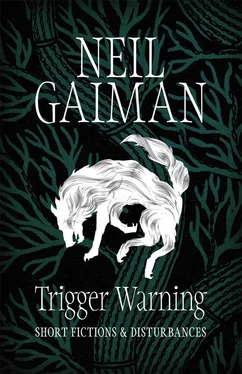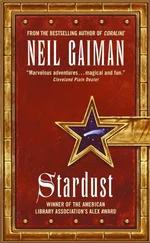Neil Gaiman - Trigger Warning - Short Fictions and Disturbances
Здесь есть возможность читать онлайн «Neil Gaiman - Trigger Warning - Short Fictions and Disturbances» весь текст электронной книги совершенно бесплатно (целиком полную версию без сокращений). В некоторых случаях можно слушать аудио, скачать через торрент в формате fb2 и присутствует краткое содержание. Год выпуска: 2015, Издательство: Headline, Жанр: Старинная литература, на английском языке. Описание произведения, (предисловие) а так же отзывы посетителей доступны на портале библиотеки ЛибКат.
- Название:Trigger Warning: Short Fictions and Disturbances
- Автор:
- Издательство:Headline
- Жанр:
- Год:2015
- ISBN:нет данных
- Рейтинг книги:4 / 5. Голосов: 1
-
Избранное:Добавить в избранное
- Отзывы:
-
Ваша оценка:
- 80
- 1
- 2
- 3
- 4
- 5
Trigger Warning: Short Fictions and Disturbances: краткое содержание, описание и аннотация
Предлагаем к чтению аннотацию, описание, краткое содержание или предисловие (зависит от того, что написал сам автор книги «Trigger Warning: Short Fictions and Disturbances»). Если вы не нашли необходимую информацию о книге — напишите в комментариях, мы постараемся отыскать её.
Trigger Warning: Short Fictions and Disturbances — читать онлайн бесплатно полную книгу (весь текст) целиком
Ниже представлен текст книги, разбитый по страницам. Система сохранения места последней прочитанной страницы, позволяет с удобством читать онлайн бесплатно книгу «Trigger Warning: Short Fictions and Disturbances», без необходимости каждый раз заново искать на чём Вы остановились. Поставьте закладку, и сможете в любой момент перейти на страницу, на которой закончили чтение.
Интервал:
Закладка:
I need them, and they give me an excuse to stop driving, wherever I am, and actually to talk to people. I have been invited into people’s houses and into their lives because I wholeheartedly appreciated the zoos they made from engine parts, the houses they had built from tin cans, stone blocks and then covered with aluminium foil, the historical pageants made from shop-window dummies, the paint on their faces flaking off. And those people, the ones who made the roadside attractions, they would accept me for what I am.
***
‘We burned it down,’ said my guide. He was elderly, and he walked with a stick. I had met him sitting on a bench in front of the town’s hardware store, and he had agreed to show me the site that the lunar labyrinth had once been built upon. Our progress across the meadow was not fast. ‘The end of the lunar labyrinth. It was easy. The rosemary hedges caught fire and they crackled and flared. The smoke was thick and drifted down the hill and made us all think of roast lamb.’
‘Why was it called a lunar labyrinth?’ I asked. ‘Was it just the alliteration?’
He thought about this. ‘I wouldn’t rightly know,’ he said. ‘Not one way or the other. We called it a labyrinth, but I guess it’s just a maze . . .’
‘Just amazed,’ I repeated.
‘There were traditions,’ he said. ‘We would start to walk it the day after the full moon. Begin at the entrance. Make your way to the centre, then turn around and trace your way back. Like I say, we’d only start walking the day the moon began to wane. It would still be bright enough to walk. We’d walk it any night the moon was bright enough to see by. Come out here. Walk. Mostly in couples. We’d walk until the dark of the moon.’
‘Nobody walked it in the dark?’
‘Oh, some of them did. But they weren’t like us. They were kids, and they brought flashlights, when the moon went dark. They walked it, the bad kids, the bad seeds, the ones who wanted to scare each other. For those kids it was Hallowe’en every month. They loved to be scared. Some of them said they saw a torturer.’
‘What kind of a torturer?’ The word had surprised me. You did not hear it often, not in conversation.
‘Just someone who tortured people, I guess. I never saw him.’
A breeze came down towards us from the hilltop. I sniffed the air but smelled no burning herbs, no ash, nothing that seemed unusual on a summer evening. Somewhere there were gardenias.
‘It was only kids when the moon was dark. When the crescent moon appeared, then the children got younger, and parents would come up to the hill and walk with them. Parents and children. They’d walk the maze together to its centre and the adults would point up to the new moon, how it looks like a smile in the sky, a huge yellow smile, and little Romulus and Remus, or whatever the kids were called, they’d smile and laugh, and wave their hands as if they were trying to pull the moon out of the sky and put it on their little faces.
‘Then, as the moon waxed, the couples would come. Young couples would come up here, courting, and elderly couples, comfortable in each other’s company, the ones whose courting days were long forgotten.’ He leaned heavily on his stick. ‘Not forgotten,’ he said. ‘You never forget. It must be somewhere inside you. Even if the brain has forgotten, perhaps the teeth remember. Or the fingers.’
‘Did they have flashlights?’
‘Some nights they did. Some nights they didn’t. The popular nights were always the nights where no clouds covered the moon, and you could just walk the labyrinth. And sooner or later, everybody did. As the moonlight increased, day by day – night by night, I should say. That world was so beautiful.
‘They parked their cars down there, back where you parked yours, at the edge of the property, and they’d come up the hill on foot. Always on foot, except for the ones in wheelchairs, or the ones whose parents carried them. Then, at the top of the hill some of them’d stop to canoodle. They’d walk the labyrinth too. There were benches, places to stop as you walked it. And they’d stop and canoodle some more. You’d think it was just the young ones, canoodling, but the older folk did it, too. Flesh to flesh. You would hear them sometimes, on the other side of the hedge, making noises like animals, and that always was your cue to slow down, or maybe explore another branch of the path for a while. Doesn’t come by too often, but when it does I think I appreciate it more now than I did then. Lips touching skin. Under the moonlight.’
‘How many years exactly was the lunar labyrinth here before it was burned down? Did it come before or after the house was built?’
My guide made a dismissive noise. ‘After, before . . . these things all go back. They talk about the labyrinth of Minos, but that was nothing by comparison to this. Just some tunnels with a horn-headed fellow wandering lonely and scared and hungry. He wasn’t really a bull-head. You know that?’
‘How do you know?’
‘Teeth. Bulls and cows are ruminants. They don’t eat flesh. The minotaur did.’
‘I hadn’t thought of that.’
‘People don’t.’ The hill was getting steeper now.
I thought, There are no torturers, not any longer. And I was no torturer. But all I said was, ‘How high were the bushes that made up the maze? Were they real hedges?’
‘They were real. They were high as they needed to be.’
‘I don’t know how high rosemary grows in these parts.’ I didn’t. I was far from home.
‘We have gentle winters. Rosemary flourishes here.’
‘So why exactly did the people burn it all down?’
He paused. ‘You’ll get a better idea of how things lie when we get to the top of the hill.’
‘How do they lie?’
‘At the top of the hill.’
The hill was getting steeper and steeper. My left knee had been injured the previous winter, in a fall on the ice, which meant I could no longer run fast, and these days I found hills and steps extremely taxing. With each step my knee would twinge, reminding me, angrily, of its existence.
Many people, on learning that the local oddity they wished to visit had burned down some years before, would simply have gotten back into their cars and driven on towards their final destination. I am not so easily deterred. The finest things I have seen are dead places: a shuttered amusement park I entered by bribing a night watchman with the price of a drink; an abandoned barn in which, the farmer said, half a dozen bigfoots had been living the summer before. He said they howled at night, and that they stank, but that they had moved on almost a year ago. There was a rank animal smell that lingered in that place, but it might have been coyotes.
‘When the moon waned, they walked the lunar labyrinth with love,’ said my guide. ‘As it waxed, they walked with desire, not with love. Do I have to explain the difference to you? The sheep and the goats?’
‘I don’t think so.’
‘The sick came, too, sometimes. The damaged and the disabled came, and some of them needed to be wheeled through the labyrinth, or carried. But even they had to choose the path they travelled, not the people carrying them or wheeling them. Nobody chose their paths but them. When I was a boy people called them cripples. I’m glad we don’t call them cripples any longer. The lovelorn came, too. The alone. The lunatics – they were brought here, sometimes. Got their name from the moon, it was only fair the moon had a chance to fix things.’
We were approaching the top of the hill. It was dusk. The sky was the colour of wine, now, and the clouds in the west glowed with the light of the setting sun, although from where we were standing it had already dropped below the horizon.
Читать дальшеИнтервал:
Закладка:
Похожие книги на «Trigger Warning: Short Fictions and Disturbances»
Представляем Вашему вниманию похожие книги на «Trigger Warning: Short Fictions and Disturbances» списком для выбора. Мы отобрали схожую по названию и смыслу литературу в надежде предоставить читателям больше вариантов отыскать новые, интересные, ещё непрочитанные произведения.
Обсуждение, отзывы о книге «Trigger Warning: Short Fictions and Disturbances» и просто собственные мнения читателей. Оставьте ваши комментарии, напишите, что Вы думаете о произведении, его смысле или главных героях. Укажите что конкретно понравилось, а что нет, и почему Вы так считаете.







